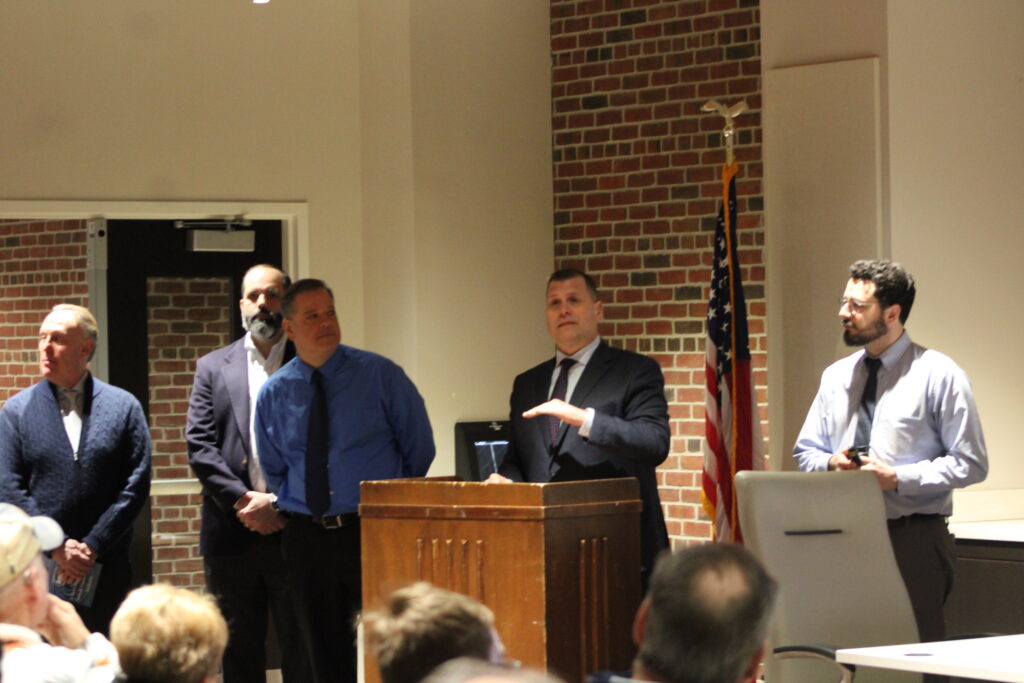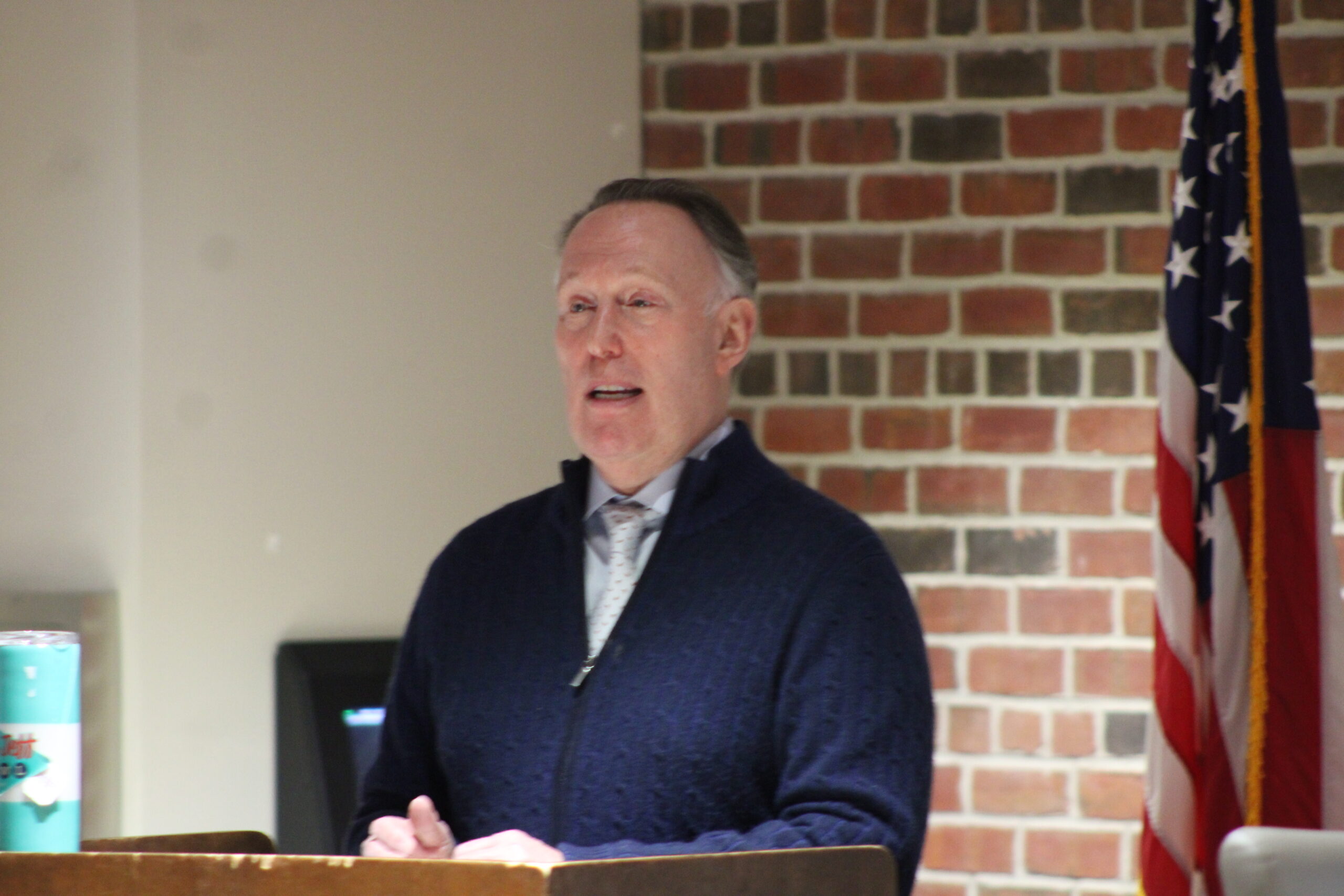Cover photo: SCWA Chairman Charlie Lefkowitz (Credit – Matt Meduri)
As part of the Suffolk County Water Authority’s (SCWA) initiative to interact with the public and disseminate information about the company, as well as advice and education on water conservation, the “WaterTalk” community forum was brought to Setauket on Monday night, in coordination with the Three Village Civic Association.
The well-attended meeting took place in the meeting room of the Setauket-East Setauket Fire Department, where top members of the SCWA informed the public on what the company does and took questions from the audience.
“The Suffolk County Water Authority, at the end of the day, does one thing: it delivers affordable, clean and safe drinking water,” said SCWA Chairman Charlie Lefkowitz, clarifying that the SCWA is not a government entity, rather a business that intends to function as a business.
“This [the sole-source aquifer] is our natural resource, and as residents of Suffolk, residents of this community, we need to protect it,” said Lefkowitz.
SCWA CEO Jeff Szabo introduced the company to the group.
“A few years ago, we created this forum [WaterTalk]. Every couple of months, we’ll go to a different community, from Melville to Montauk, in public libraries, fire departments, and schools to answer specific questions and address the issues,” said Szabo.
The SCWA is a public benefit corporation operating under New York State law, under the New York State Public Authorities Act, serving about 1.2 million customers. The company was founded in 1951, operating without tax revenue.
Szabo mentioned that Long Island’s aquifer scenario is unique, being one of the largest groundwater supplies in the region, but in a more precarious situation than our neighbors. Upstate residents get their water from lakes, rivers, and reservoirs, while the underground sole-source aquifer provides Long Island with its water. Interestingly, Szabo shared that around 25,000 Suffolk County residents – primarily within the Town of Southold – still get their water from wells.
“The SCWA does not create or enforce drinking water regulations. We don’t set the rules, but we are responsible for making sure that the water that comes out of the tap complies with all of those rules,” said Szabo, adding that such regulations come from the New York State Health Department, the Suffolk County Health Department, and the federal Environmental Protection Agency.
“Collectively, the three layers of the sole-source aquifer contain approximately sixty-five trillion gallons of groundwater. We might pump between sixty-six and seventy-two billion gallons any individual year,” said Szabo. “All of that is recharged, so everything we pump annually is going to collect back into the aquifer system. So, there’s very, very little risk here in Suffolk of actually depleting all the water in the aquifer.”
But, Szabo warns, risks are still present.
Tom Schneider, Director of Construction and Maintenance, shared that the SCWA has one of the largest groundwater testing laboratories in the entire nation, with last year’s testing producing nearly two million results over nearly 200,000 tests of 600 groundwater wells.
“We’re regulated to test for 129 different parameters, we test for 414, which is a lot more than required,” said Schneider. “We have 330 sampling stations all around our distribution system. These could be right outside your home, business, or school.”
Schneider also shared that while bottled water is a good option for residents, tap water in western Suffolk is safe to drink.
“The drinking water that we provide is more tested,” said Schneider.
Schneider then discussed the usual suspects of contamination, PFAS and PFOS, synthetic compounds found in a wide variety of household goods that are otherwise known as “forever chemicals.” 1-4 Dioxane is another harsh synthetic chemical found in detergents, shampoos, and conditioners. All are contaminants the SCWA tests for and treats, typically through their granulated carbon water filters.
But even such filters, according to Schneider, cannot exterminate the chemicals, instead requiring advanced oxidation and ultraviolet light to break down the 1-4 Dioxane.
Filtration methods and contaminated sites can be viewed online at the SCWA’s website.
Brendan Warner, Director of Construction and Maintenance, discussed the infrastructure contained within SCWA’s scope.
“We have over 600 wells across the county, scattered across over 200 pump stations. We have about seventy storage tanks; our average daily pumpage is 210 million gallons,” said Warner.
Warner then displayed a graph showing the seasonal pumpage rates. In the winter months, the SCWA pumps 25,000 gallons per minute, compared to the peak rate of 500,000 gallons per minute in the summer mornings, usually when sprinklers are timed to water lawns. Summer rain seasons typically see over 300,000 gallons per minute, with summer weekend utilizing more usage on average.
To conserve water – which reduces customers’ overall water bills – Warner recommends watering on an odd/even basis, with odd-numbered and even-numbered addresses watering lawns on alternating days throughout the weeks during the summer. He also shared that if a lawn springs back up after being stepped on, the lawn is sufficiently watered. Thus, a watering day should be skipped.
Warner added that SCWA maintains over 48,000 fire hydrants, wherein fire districts pay rental fees to the SCWA for the hydrants in the street. Water pressure is divided between the different independent zones, based on elevation of the land in the area.
Main breaks can also be monitored by customers on the SCWA website. Main breaks can sometimes be fairly innocuous, such as a small pipe leak underground, as opposed to the large-scale floods, pooling, and road closures that a more significant break can cause. The SCWA is also below the yearly average for main breaks – 500 – resting at over 300 last year.
Warner discussed how the SCWA’s organization and methodology, specifically a color-coded method for their pipes, help them stay on top of main breaks and routine maintenance. The Supervisory Control and Data Acquisition (SCDA) system controls the different pump stations through a radio communication system that all connect to their central control center in Bay Shore.
Questions were then fielded from the audience, the first of which included how often individual water systems should be inspected and tweaked by season.
“Getting your irrigation system inspected every three-to-four years is critical, because you might know if one of your sprinkler heads isn’t working, but you might not know if a hose underground has a leak,” said John Marafino, Customer Growth Coordinator. “Those can really add up to a lot of water loss.”
Marafino also advised to ensure sprinkler heads are not aimed at driveways and surfaces to maximize water usage. Overwatering, while unnecessary, can be unhealthy for a lawn. Water intermittently can help promote more drought-resistant lawns. Overwatering can not only lead to drowned plants and shallow roots, but also cause weed growth, disease, fungus, and send those and other pollutants to the local waterways.
Marafino stressed that if a resident is looking to convert to geothermal heating, consulting with SCWA can be beneficial, as geothermal uses much more water than conventional heating methods, resulting in a much larger bill.
The SCWA also offers a smart irrigation timer with a credit system, wherein the company will provide a credit of up to $150 for consistent use of an irrigation controller.
“The average customer who uses any of the water saving devices we have, they have about 15% of their water bill on top of whatever credit that they receive. We can’t recommend that strongly enough,” said Marafino, adding that the SCWA can perform at-home consultations or remote calls with customers.
One resident asked what kinds of household products that contain synthetic “forever chemicals” should be avoided.
“They’re in a lot of the products we all use, and it’s not disclosed on the labels,” said Schneider. “Fortunately, we have equipment that can find new pollutants; we don’t have to actually be looking for them. We’re fortunate that our wells are relatively deep, so it takes time,” he added, referring to how long it takes chemicals to break down into the aquifer.
However, the SCWA members in attendance said that they cannot endorse a specific list of products to purchase or avoid, as that is not their prerogative. Rather, there are independent websites with lists of such products. The Citizens’ Campaign for the Environment was mentioned as one such source.
“When we do the testing, we get the data, which is available on the website, and we give the data right to the state health departments,” said Warner. “We’re not toxicologists; our goal is to remove [chemicals and pollutants].”
Another question pertained to the individual zones, some of which are massive and can scramble averages of overall water health and safety. Zone One extends from East Farmingdale – the county line – all the way to the East End. The SCWA members said they are working on simplifying and localizing reports so residents can get a more exact idea of what’s in their water.
Another resident asked if the SCWA recommends home filtration systems.
The SCWA finds that faucet or fridge filters, such as a Brita filter, while not necessary to filter contaminants, are still safe for use. However, in many cases, the SCWA does not recommend home filtration systems, as they often require more maintenance and cost than they are worth.
One question pertained to landfill refuse leaching into the groundwater, to which SCWA said that most landfills or dump sites aren’t designed near pockets of groundwater, and in events of leaching, the SCWA monitors and treats the effluent.
The SCWA ended the seminar by sharing that they’re working on connecting the more remote parts of the county whose water quality languishes behind that of the rest of the county, and where residents are sourcing water primarily from on-property wells. The SCWA hopes to connect the Town of Southold through an eight-mile pipeline from Flanders.
Visit scwa.com/contact for a wide variety of contacts for water-related needs and services.





